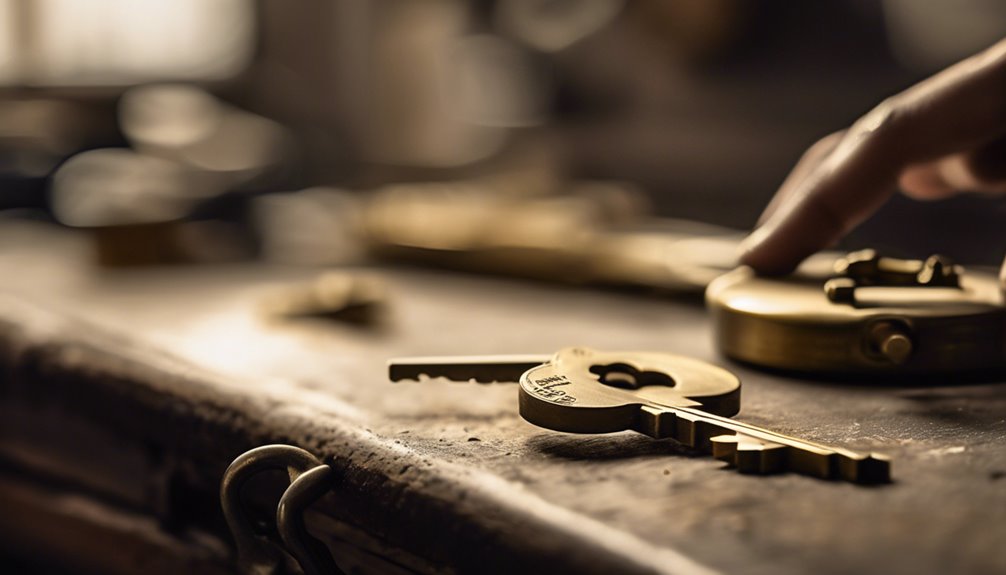Have you ever wondered what it really takes to become a locksmith in Iowa? While many believe it requires extensive schooling, the reality might surprise you. There are specific steps you can follow to enter this trade, and understanding the requirements is essential. What do you need to do first? Let’s explore the pathways to a successful locksmith career in Iowa.
Key Takeaways
- Meet the eligibility requirements: be at least 18 years old and demonstrate good moral character, as criminal history may not disqualify you.
- Enroll in locksmith training courses or apprenticeship programs to gain hands-on experience in the field.
- Obtain necessary business licenses and permits to operate legally in Iowa, including a general business license.
- Consider getting certified by recognized organizations to enhance your credibility and improve job prospects.
- Stay updated on industry trends and technological advancements through continuing education and workshops.
Eligibility Requirements for Becoming a Locksmith in Iowa

To commence a career as a locksmith in Iowa, you need to meet a few basic eligibility requirements. First, you must be at least 18 years old and demonstrate good moral character; a criminal history doesn’t automatically disqualify you.
While there are no specific educational requirements, it’s beneficial to complete a locksmith training program and gain hands-on experience through an apprenticeship, helping you develop essential practical skills.
Although Iowa doesn’t mandate a state license, you must register your business with local authorities and obtain necessary permits.
Additionally, consider joining a trade association like the Associated Locksmiths of America, which can offer valuable resources and networking opportunities to advance your locksmith career.
Training and Education Pathways
After meeting the eligibility requirements to become a locksmith in Iowa, it’s time to focus on your training and education pathways. You can choose from various options to gain the skills you need:
- Enroll in locksmith training courses at local locksmith schools or complete an online locksmith course through programs like Penn Foster or Ashworth College.
- Join apprenticeship programs that provide hands-on experience while working under experienced professionals for 2 to 4 years.
- Participate in continuing education to stay updated on advancements in security technology.
- Consider obtaining certification from recognized organizations to enhance your credibility, although it’s optional in Iowa.
These pathways offer a solid foundation and practical exercises to prepare you for a successful locksmith career.
Steps to Start Your Locksmith Career

To kickstart your locksmith career in Iowa, you’ll need to focus on training and education options that suit your needs.
Gaining hands-on experience through an apprenticeship is essential, as it’ll prepare you for real-world challenges.
Finally, if you’re feeling entrepreneurial, consider starting your own locksmith business to put your skills to use.
Training and Education Options
While you might be enthusiastic to plunge into a locksmith career, understanding the training and education options available is essential for your success.
Here are some key steps to contemplate:
- Enroll in an online locksmith training program, such as those from Penn Foster or Ashworth College, which typically last 4 to 7 months.
- Gain practical experience through an apprenticeship, usually lasting 2-4 years, under experienced locksmiths.
- Pursue continuing education by attending industry seminars to stay updated on advancements in security technology.
- Obtain a certificate from organizations like ALOA to enhance your credibility, and contemplate joining a trade association for networking opportunities.
Each of these steps will help you navigate the locksmith industry successfully.
Gaining Hands-On Experience
Hands-on experience is essential for launching your locksmith career. Start by seeking a locksmith apprenticeship, which typically lasts 2-4 years and offers practical on-the-job training under an experienced locksmith.
You might also consider enrolling in locksmith training programs at local locksmith schools, like Penn Foster or Ashworth College, to gain valuable theoretical knowledge.
Participating in locksmithing workshops can further enhance your skills while allowing you to network with industry professionals.
Joining the Associated Locksmiths of America (ALOA) can provide access to resources and certifications that boost your practical skills.
Additionally, gaining experience in related fields, such as security systems installation, can equip you with the knowledge necessary for a successful locksmithing career.
Starting Your Business
Starting your own locksmith business in Iowa is an exciting venture that requires careful planning and execution. Here are some key steps to get you started:
- Complete locksmith training through a trade school or online programs, like Penn Foster, for certification.
- Gain hands-on experience by applying for an apprenticeship with a licensed locksmith, typically lasting 2-4 years.
- Register your locksmith business at City Hall and guarantee you obtain any necessary local permits, as Iowa doesn’t require state licensing.
- Invest in liability insurance to protect your business and build a strong online presence with a professional website to enhance customer outreach.
Taking these steps will help you establish a successful locksmith business in Iowa.
Licensing and Business Registration in Iowa

To operate as a locksmith in Iowa, you’ll need to complete local business registration and secure any necessary permits.
It’s also essential to take into account insurance requirements to protect your business and yourself.
Understanding these steps will guarantee you comply with local regulations and set your locksmith career on the right path.
Local Business Registration Steps
Before launching your locksmith business in Iowa, it’s vital to understand the local business registration steps. Here’s what you need to do:
- Register your business with City Hall and acquire necessary local permits.
- Obtain a general business license, as it’s imperative for legal operation, even though no state licensing is required for locksmiths.
- If you plan to sell locks, get a seller’s permit and register for sales tax with the state.
- Consult local authorities to guarantee compliance with all local business laws.
Additionally, consider obtaining liability insurance to protect your locksmith company from potential claims.
Engaging in online courses and joining trade associations can help you meet required training and enhance your skills.
Insurance Requirements Overview
What do you need to know about insurance requirements for your locksmith business in Iowa? While locksmiths in Iowa don’t need a state license, business registration with local authorities is crucial. A general liability insurance policy is highly recommended to protect your locksmith business from potential claims. If you plan to sell locks or related products, you’ll also need a seller’s permit. Here’s a quick overview:
| Requirement | Description | Importance |
|---|---|---|
| General Liability Insurance | Protects against claims | Essential for financial security |
| Seller’s Permit | Required for selling products | Compliance with state regulations |
| Fictitious Name Registration | Needed if using a business name | Guarantees legal recognition |
Compliance with local regulations is key to operating successfully as a locksmith in Iowa.
Advancing Your Career With Certifications
While you may already possess the foundational skills to work as a locksmith, obtaining certifications can greatly elevate your career prospects.
Pursuing locksmith certifications from recognized organizations like the Associated Locksmiths of America (ALOA) opens doors to advanced opportunities.
Here are four key benefits:
- Specialization: Certifications in areas like automotive locksmithing and electronic security enhance your expertise.
- Higher Earnings: Certified locksmiths often command better rates for their skills.
- Continuing Education: Many programs require ongoing training, keeping you updated on the latest security systems.
- Networking Opportunities: Joining a professional trade association provides resources and connections that can help you advance your career.
Salary Expectations and Growth Potential

Locksmiths in Iowa can expect to earn an average annual salary between $36,721 and $58,450, translating to about $28 an hour.
Your salary as a locksmith can vary based on your experience level, employer type, and specialized certifications. Those with advanced skills often see higher earnings potential, particularly in areas like automotive locksmithing and electronic security.
With a weekly salary reaching up to $1,124, or about $4,871 monthly, the locksmith trade offers solid financial rewards. The demand for locksmith services remains steady, ensuring promising job prospects.
As you gain experience and expertise, you’ll not only enhance your skills but also open doors to significant career growth and increased salary opportunities in this field.
Frequently Asked Questions
How Much Does a Locksmith Make in Iowa?
Imagine yourself expertly opening doors, the click of the mechanism echoing in the quiet.
In Iowa, you’ll find locksmiths earn between $36,721 and $58,450 annually, with hourly rates around $28. If you’re skilled, you could make up to $1,124 weekly!
Your earnings depend on factors like experience and employer type, but with the right qualifications, you could reach monthly highs of about $4,871, thriving in a competitive market.
How Long Does It Take to Learn to Be a Locksmith?
It typically takes you about 2 to 4 years to become proficient as a locksmith.
You’ll gain hands-on experience through apprenticeship programs, learning directly under a licensed locksmith.
If you opt for online training, you can complete courses in around 4 to 7 months, covering essential skills.
Do You Need a Permit to Be a Locksmith?
In the locksmithing landscape, you won’t need a specialized state permit to practice your craft.
However, you must navigate local regulations, registering your business with City Hall. If you’re selling locks, a seller’s permit and sales tax registration are essential.
Even without a state permit, it’s smart to secure general liability insurance to shield yourself from potential pitfalls.
Consider connecting with professional associations for networking and resources, though it’s not a requirement.
Do Locksmiths Make Good Money?
Yes, locksmiths can make good money.
You’ll find that the average annual salary ranges from about $36,721 to $58,450, translating to an hourly wage of roughly $28. Your earnings can vary based on experience, the type of employer, and any additional certifications you obtain.
If you specialize in certain areas, you might even command higher rates.
With steady demand for security services, job prospects and income stability look promising in this field.








